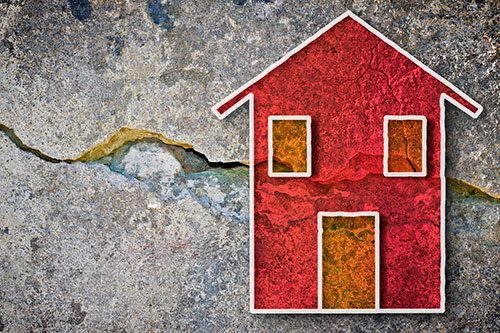You just got the inspection report back, and the home you hoped to own has foundation problems. Should you scrap your plans to buy or try to take advantage of the deal? Read on to learn about common foundation problems and how they can affect the value and safety of a home, both now and in the years to come.
Is it Worth the Risk?
It’s easy to see why the prospect of paying less for an imperfect property would be enticing. While they certainly aren’t ideal, foundation problems can lead to lower prices on homes. At the same time, they also come with extreme risk. If you buy a home with foundation problems, you could face any of the following issues:
You may require a different type of financing. If you’ve already prequalified for a home loan – especially through stricter traditional lenders, the Department of Housing and Urban Development (HUD) or the Department of Veterans Affairs (VA loan) – you may need to seek different financing. Unlike standard loans, HUD and VA programs require that a property is structurally sound. Even if the lender agrees to finance a home with foundation issues, you may have to provide a bigger down payment and pay a higher interest rate.
Repairs could be costly. You will need to repair any cracks in a foundation that are wider than 1/4 inch. This can cost several thousands of dollars and is only a band-aid solution that doesn’t address the actual cause of the problem. Depending on the underlying issue, you could end up paying a little or a lot. In some cases, foundation issues can be corrected by replacing downspouts and gutters. In others, you may be able to solve the problem by grading the land around the home to ensure that it slopes away from the foundation. Unfortunately, if the damage is substantial, you may have to hire someone to rebuild the foundation, which will result in a bill for tens of thousands of dollars. In extreme situations, you may even have to replace the entire foundation at a cost of approximately $100,000.
You could incur other costs. Problems with the foundation often lead to other issues within a home. If you buy a home with foundation issues, you may have to pay to replace broken tiles, crooked windows and doors, cracked drywall and/or damaged or warped hardwood floors. Since you won’t be able to fix these issues until after the foundation has been repaired, you may have to live with these issues for a considerable amount of time.
The problems could run deeper. While foundation problems are serious, they can be fixed in the vast majority of cases. In some instances, however, a repair may not be enough. Even if the foundation is built perfectly, it won’t hold up if the underlying soil continues shifting. Experienced builders typically perform soils tests before they begin constructing a new home to ensure that it can adequately support a home’s foundation. Unfortunately, these tests can sometimes fail, and some builders may even neglect to test the soil at all. In these cases, more extensive foundation repairs will be needed. The home may even need to be lifted to make room for new foundation piers designed to reinforce the existing foundation.
The Bottom Line
Any time you find a home priced well below the market rate, you should proceed with caution. Make sure you get a thorough inspection from a qualified professional. If you do decide to put in an offer on a home that needs foundation repair, work with your agent to make sure all of the appropriate contingency clauses are in place. This will give you ample opportunity to back out of the deal long before you reach the closing table.
2-10 HBW offers the most comprehensive warranty coverage for homeowners. Let us help you protect your largest investment.








